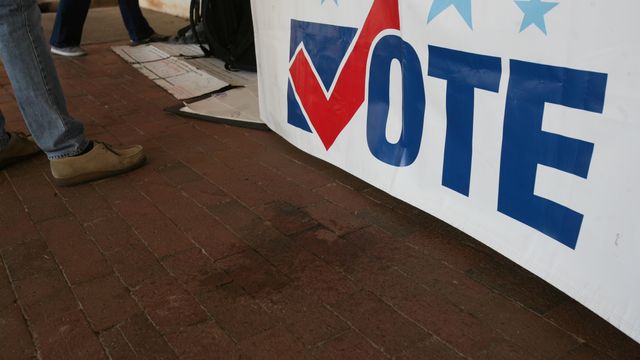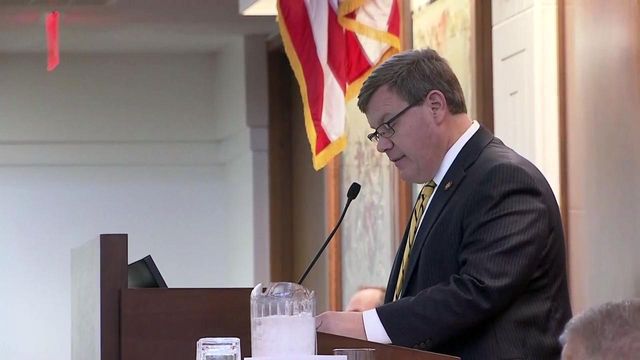Latest plan to overhaul elections board heads to Cooper
Lawmakers quickly approved Wednesday a proposal to split the State Board of Elections and Ethics Enforcement in two, returning to the set-up the state had two years ago.
Posted — UpdatedThe legislation cleared the House 82-17 and the Senate 34-3 less than a day after Republican leaders rolled it out. Because of the way the proposal was structured, it required only one vote in each chamber, and no amendments were allowed.
The plan now goes to Gov. Roy Cooper, whose repeated legal challenges over legislative changes to the elections board have resulted in a two-year-long court battle that has twice gone before the state Supreme Court.
"North Carolinians deserve honest and fair elections, and the governor is reviewing this legislation carefully," Cooper spokesman Ford Porter said in an email.
Under the legislation, the state board would be split into two agencies: a five-member elections board appointed by the governor that would likely have a three-person majority of his or her party and an eight-member ethics commission that would have four people appointed by the governor and four by lawmakers and would likely be evenly split between Republicans and Democrats.
The two boards and their composition would be the same as they were before December 2016, when lawmakers merged them into an evenly divided eight-member board that they would appoint, arguing that no political party should have power over elections in North Carolina.
To comply with court rulings, lawmakers have tweaked the makeup of the board several times, including giving all appointments back to Cooper – Democratic and Republican party officials nominate people from which he chooses – and adding a ninth member who isn't affiliated with either party.
"This bill makes every effort to comply with the court’s ruling and gives Governor Cooper the partisan control over the State Board of Elections that he has sued for," Rep. David Lewis, R-Harnett, chairman of the House Elections Committee, said in a statement.
In addition to splitting the elections and ethics board in two, the legislation would allow the elections board to handle campaign finance investigations and would return lobbying enforcement to the Secretary of State's Office – as was the case before 2017.
The new legislation includes a few provisions linked to the ongoing state investigation of suspicious absentee voting in the 9th Congressional District election:
- The split wouldn't take effect until Jan. 31 to give the current elections board several weeks to complete its investigation.
- If the elections board finds fraud occurred and orders a new election, new primaries would be held as well.
- Lawmakers want the state board to investigate absentee voting statewide over the last five election cycles to determine if other irregularities exist.
- Mail-in absentee ballots must, in the future, be witnessed by two people who certify the identity of the person who filled out the ballot, and county elections officials would send that witness information to the state board.
The new primary provision was in the original bill as unveiled on Tuesday, but it was later removed after some in the Senate balked. No reason was provided Wednesday as to why it was reinserted.
"Voters deserve a fair election, free of any tampering, and the only way to fully guarantee that is to completely start over with the primary, if there must be a new election," Sen. Dan Bishop, R-Mecklenburg, vice chairman of the Senate Elections Committee, said in a statement.
Most Democrats voted for the bill, but some did express concerns. House Minority Leader Darren Jackson, for example, criticized one provision that delays the deadline for outside groups to report spending on elections.
"These dark-money groups are going to be able to remain dark for an additional 30 or so days. I feel like we're moving the wrong direction on that particular issue," said Jackson, D-Wake.
County boards were expanded from three to four members in 2017, evenly split between Democrats and Republicans. Rather than kick someone off and revert to three-member boards, the measure would allow the governor to appoint a fifth person and name the chair, Lewis said.
Voters last month approved the voter ID requirement as an amendment to the state constitution, and lawmakers last week passed rules to implement it. Voter ID was supposed to begin with the municipal primaries in the spring, but Lewis said it would take longer to "turn the switch."
Lawmakers traditionally have been given a 14-day window to redraw voting maps in redistricting cases, but the measure wouldn't start the clock ticking on that 14-day period until the General Assembly reconvenes, if it is within 45 days of the court order.
Related Topics
• Credits
Copyright 2024 by Capitol Broadcasting Company. All rights reserved. This material may not be published, broadcast, rewritten or redistributed.






